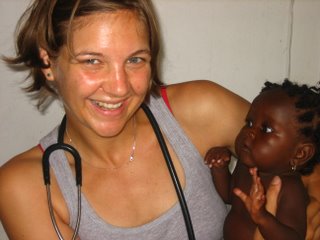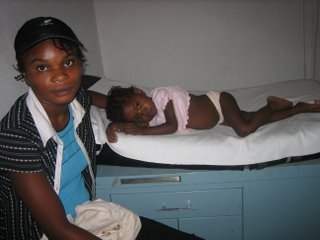


Haiti, Day 2
Outside the air is thick and heavy and while it is visibly clear, there is no breeze. I can see more stars than I new existed because without my mega-light (thanks dad), there is none. It is hot and if I was not trying to separate my self from the mosquito's and other flying insects, the best outfit would be a bathing suit.
Today, while the official day of rest, was full. It began with a two hour church service in which we (the seven Americans here) were treated as esteemed guests although we looked more awkward and sweaty than anyone, clutching water bottles and holding cameras. Upon entering the church, each member of the community shook our hands, and the old ladies kissed us wetly on our sweaty cheeks. Each person said welcome in their own way: my favorite? Baby Jeffrey that I was lucky to be holding peed in my arms. The church service, accompanied throughout by 17 year old Woodsie on the Guitar, two young drum players, and an aspiring keyboard artist, was full of music, of clapping, of lace on heads, and of joy. Truly incredible smiles and thanks in the midst of striking poverty.
After PB and J offered to us on white bread for lunch, we left for the clinic. I grinned to see that the pharmacy that Patti (the physician with whom I am traveling) spent many hours organizing and labeling last year was still organized. The clinic showed a striking improvement from last year when the pharmacy was cluttered and full of mouse-chewed bottles of expired meds. As we sorted our brought meds and placed them in their proper place on the shelves, I chatted with Judette, the the new nurse who works as a provider in the clinic. She impressed me with her knowledge of medication uses. She, a new grad like myself, works as a full provider in the clinic each day except for the two days a week when Cuban doctors visit. We shared blow-pops and laughed at funny uses for medications. Nurse humor, I suppose.
We then walked around the small village of LaCroix, flanked on either side by kids who ran to hold our hands and play games as we walked. Jason, a 19 year old, wanted to hold mine. I told him he was too big and chose to hold the hand of an adorable 7 year old with braids who spoke no French. After 'quel age ou' (how old are you) and 'what is your name?' we ran out of things to say, but we squeezed each others hands and enjoyed the scenery of the overflowing busses zooming past us. On the walk we past a coconut tree and all sampled warm coconut water released by machete. Some of the prepared kids whipped out spoons and began eating the soft meat. Note to self: always bring a spoon.
I am nervous about what tomorrow will hold. The plan is for an EMT from Vermont and me to run one exam room and Patti and a medical assistant from my old clinic in Vermont to run the other. As much as I learned this year, we did not learn diagnostic skills, and certainly did not specialize in tropical medicine. I hope that my knowledge of medications, my ability to give a darn good bed bath, and prior experience here will see us through.
In the words of my Haitian friend Mezier who is taking his national exam tomorrow - "Pray for me."
 (Above: The twins, Asna and Asli. After collecting water at night from the pump)
(Above: The twins, Asna and Asli. After collecting water at night from the pump)



